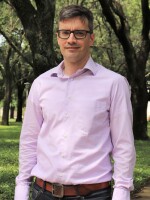People know Titus O’Neil as a star of WWE.
But before he was a pro wrestler and Global Ambassador for WWE, Titus O’Neil was Thaddeus Bullard. He began his athletic career as a promising football player - a University of Florida Gator who played under legendary coach Steve Spurrier, and later in the Arena Football League.
Bullard's path to athletic fame and fortune wasn’t an easy one. He writes about his upbringing to a single mother who struggled to make ends meet in his book, "There's No Such Thing as a Bad Kid." But along the way, Bullard built a reputation as someone who’s worked to give back to his community. Through the Bullard Family Foundation, he's helped kids who face the same kind of challenges he did growing up.
Over the last decade Bullard, who lives in Tampa, has given out more than 15,000 gifts every year to underprivileged kids through his "Joy of Giving" event. And in partnership with Hillsborough County Public Schools - he’s worked to transform Sligh Middle Magnet School into an educational innovation hub.
This year he received the University of South Florida’s Kente Community Award. The Joyce Russell Kente Awards celebrate the achievements of Tampa Bay area community leaders and USF alumni.
As WWE's "Global Ambassador," Bullard said he works to showcase the work of nonprofits that are making a difference in their communities wherever WWE goes.
"We usually highlight three to five community champions that are doing things whether it's built around food insecurity, or housing, or working with underserved kids, teachers, education," said Bullard.
He said what drew him to wrestling, first as a fan, and later as a wrestler himself, was "the storytelling and the character building, and being able to control how a person feels, and understanding how to translate that into real life situations."
In a moment that went viral in 2018, he tripped and slid under the ring. Fans dubbed it the "Titus slide."
"As funny as it is to a lot of people I literally could have lost my life that day. Because the LED board wasn't up, and there usually are bars and tables and ladders and chairs, etc., underneath. And thank God that that wasn't the case," said Bullard.
"For me, that is one of several moments that I had in WWE that I can honestly say, fall down, get back up, and you show people how to gracefully go through life."
As a kid, Bullard said he wore glasses and was teased a lot. He channeled his frustration into sports.
"As I got older, and I understood sports a lot more and, and honestly, the anger that I had from being bullied and being poor and being told what I'll never be able to do, that actually helped me in sports, more so than anything, because it was an outlet for me at that point," he said.
At 12 years old, Bullard left home to attend the Florida Sheriffs Boys Ranch. His 18-month-stay turned into five years, but not because he was bad.
"I actually was getting off of the Boys Ranch and being sent back home. But Patrick Monogue, who I'll forever love and be indebted to said the most powerful things to me at 12 years old, that I ever heard," Bullard recalled. "He said that there's no such thing as a bad kid, which at the time, I was explaining to him that I've been told I'd be dead or in jail by the time I was 16."
This was his turning point. As a kid, Bullard watched his mom work to "make ends meet that never met," while raising four boys on her own. He was constantly reminded that he'd never graduate from high school or make it to being an adult. But the men at the Boys Ranch embraced him and showed him a love he'd never experienced.
"Having a person tell me that they loved me and that they believed in me, that was really the catalyst to help me start making sure that I believed in myself," he said.
As an adult, Bullard uses his experiences to change the lives of kids who are growing up like he did. One way he does this is through the Thaddeus M. Bullard Academy at Sligh Middle Magnet School, where kids have access to things like STEM, technology, robotics and video production. Most recently, they hired a full-time mental health and wellness specialist to assist kids in the "Zen Den." The school also works with organizations like Metropolitan Ministries and Feeding Tampa Bay to provide services to all family members, including adults, like financial literacy and job training and placement.
"These kids all reside in that 33610 zip code, which is the sixth highest zip code for kids living in poverty in the state of Florida," Bullard said. "It goes back to what I said in the book, there is no such thing as a bad kid. There are kids that are in bad situations, making bad decisions, and having bad outcomes. You put those same exact kids in a good environment around great people, they have a greater chance to succeed and therefore, they have a great outcome. So, all I'm doing is the exact same thing that was done for me."



